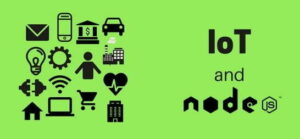The world is becoming digital and wirelessly connected. This is the reason behind the emergence of smarter locks, smartwatches, advancements in home automation and vehicle automation.
To overcome the hurdles of flow in a business requires some advanced technology that needs to facilitate data management tools, network control, and intelligent solutions.
Every big company tries to evolve by identifying the next big thing. It is a little hard to identify the technology that provides customized business needs. Considerably, IoT brings significant changes in business process management. So now it’s your turn, approach the best web application development service provider and build a highly scalable IoT application.
But before that, it is important for you to know about the IoT applications and how Nodejs helps in such builds.
NODEJS AND IoT applications
What is IoT?

IoT (Internet of Things) is a network of devices such as sensors, beacons, actuators, and any other items synced with electronic gadgets that enables them to send/receive and exchange data. In an IoT device, the system passes data over devices to servers and from servers to applications and that resultant process will display to the users.
IoT consists of thousands of such devices, which push them in the challenge in managing requests and data streams from and between the devices.
Also, IoT developers still work on data-intensive and responsive scenarios that can hold the low resource and memory requirements of Nodejs. It is widely used for structuring many digital devices that all connect to make up IoT systems.
Some popular IoT boards variants are:
- Arduino
- Raspberry PI
- Intel IoT Edition
- BeagleBone Black
The key features of any IoT device or application are collecting data, communicating, data processing, analyzing, executing. All those features make the best pair with Nodejs.
ROLE OF NODEJS in IoT applications

Nodejs is built on Google Chrome’s V8 engine. An open-source cross-platform that well-suited for real-time applications that are highly data-intensive. Since many of the IoT applications are data-intensive and work in a real-time environment with user interactive functionalities. This makes Nodejs as the best fit for this technology.
When the IoT rose popularity dramatically among the users, Nodejs has become one of the best-fit solutions for enterprises and organizations. Also, which in need to develop their private and public IoT systems.
The most important advantage of Nodejs as a back-end for such networks is its ability to process multiple concurrent requests and events emitted by thousands or even millions of devices on the network. Such a process making style makes Nodejs as fast application layer between those IoT devices.
BENEFITS OF NodeJS IN BUILDING IOT APPLICATIONS
- Numerous IoT applications use MQTT protocol and the standard Sockets which have great support in Nodejs.
- Nodejs is simple and easy to understand for even the new developers. Since Nodejs is written in C, C++, Javascript, and same the IoT devices are also written in low-level languages like C++, etc.
- The Node Package Manager (NPM) comprises many useful IoT modules. It contains more than 70+ packages for Intel IoT Edison, Raspberry Pi, Arduino Controllers and 30 packages for Bluetooth devices and sensors respectively.
- Nodejs is capable of handling numerous data and requests without affecting the performance of the applications.
- IoT devices namely sensors, motors, transmitters have to be very responsive as it handles multiple requests at the same instance. So why we use Nodejs for IoT is because it has excellent support for streams that offer readable and writable channels for request management.
CONCLUSION
Interested in building IoT applications with Nodejs? Contact us, our dedicated developers will help you to build the best web applications.

Leave a Reply